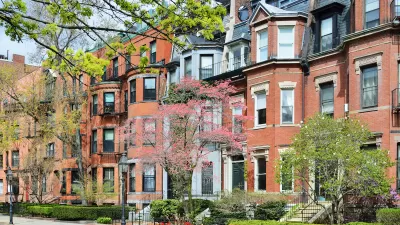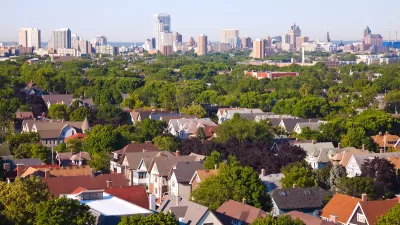An opinion piece calls out suburban communities for perpetuating structural inequality and housing discrimination. Recently converted social justice advocates should focus their zeal on zoning reform, according to the argument that follows.

Sara C. Bronin writes an opinion piece for the Courier Journal in Louisville connecting the calls for racial and social justice to land use reform as expressed by local zoning laws: "We must not forget about one of the most important perpetuators of fundamental inequalities in the country today: zoning."
"Every resident of an affluent, suburban town who marched in solidarity should be on the phone today with their elected leaders, trying to get zoning reforms on their town’s agenda," according to Bronin, to change the ongoing legacies of the exclusionary and discriminatory history of zoning.
It's no coincidence that Bronin's opinion piece is found in Louisville's local daily newspaper.
In 1916, the U.S. Supreme Court struck down this type of “racial zoning” as unconstitutional, in a case called Buchanan v. Warley. At issue was a Louisville zoning ordinance that was written “to prevent conflict and ill feeling between white and colored races,” and “to preserve the public peace.” The method of achieving these goals? The “use of separate blocks for residences, places of abode, and places of assembly by white and colored people respectively.”
Although Louisville's racial zoning didn't pass muster with the 14th Amendment, zoning practices still "perpetuate structural inequities and block access to opportunity," according to Bronin, and in 2020, the Supreme Court can't be relied on to overturn the ongoing discriminatory practices of zoning.
As documented by a recent Planetizen feature, Louisville is still struggling to correct massive disparities in public health outcomes for low-income neighborhoods and people of color.
FULL STORY: Opinion: In fight for justice, zoning laws that exclude low-income people must be changed

Maui's Vacation Rental Debate Turns Ugly
Verbal attacks, misinformation campaigns and fistfights plague a high-stakes debate to convert thousands of vacation rentals into long-term housing.

Planetizen Federal Action Tracker
A weekly monitor of how Trump’s orders and actions are impacting planners and planning in America.

In Urban Planning, AI Prompting Could be the New Design Thinking
Creativity has long been key to great urban design. What if we see AI as our new creative partner?

San Francisco Mayor Backtracks on Homelessness Goal
Mayor Dan Lurie ran on a promise to build 1,500 additional shelter beds in the city, complete with supportive services. Now, his office says they are “shifting strategy” to focus on prevention and mental health treatment.

How Trump's HUD Budget Proposal Would Harm Homelessness Response
Experts say the change to the HUD budget would make it more difficult to identify people who are homeless and connect them with services, and to prevent homelessness.

The Vast Potential of the Right-of-Way
One writer argues that the space between two building faces is the most important element of the built environment.
Urban Design for Planners 1: Software Tools
This six-course series explores essential urban design concepts using open source software and equips planners with the tools they need to participate fully in the urban design process.
Planning for Universal Design
Learn the tools for implementing Universal Design in planning regulations.
Gallatin County Department of Planning & Community Development
Heyer Gruel & Associates PA
JM Goldson LLC
Mpact (founded as Rail~Volution)
City of Camden Redevelopment Agency
City of Astoria
Jefferson Parish Government
Camden Redevelopment Agency
City of Claremont





























